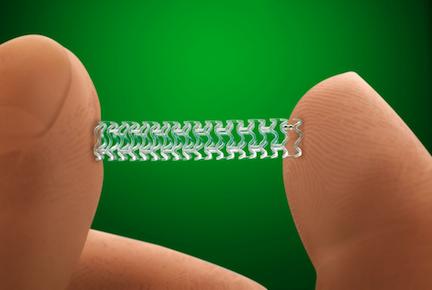
November 7, 2019 — Although the Abbott Absorb fully bioresorbable drug-eluting stent (DES) was taken off the market due to poor sales and questions on outcomes in coronary vessels compared to conventional metallic DES, it performed very well in peripheral vessels below the knee (BTK) in the ABSORB BTK Trial. The results were presented as a late-breaking trial at the 2019 Vascular Interventional Advances (VIVA) annual meeting.
This novel bioresorbable, drug-eluting scaffold has several inherent advantages over stents, related to its biological resorption. These results represent best-in-class durability for a stent-like device in this challenging vascular territory, said Ramon L. Varcoe, MBBS, MS, Ph.D., a vascular surgeon at Sydney’s Prince of Wales, who presented data at VIVA. The trial was ended early after Abbott pulled the stent from the market, but enrolled patients continued to be tracked.
The ABSORB BTK trial is a prospective, nonrandomized, single-center study designed to evaluate a novel bioresorbable, drug-eluting scaffold used for the treatment of peripheral artery disease (PAD) below the knee. There were 71 scaffolds utilized in 55 limbs of 48 patients who fulfilled the inclusion criteria (72.7% with critical limb ischemia). Most scaffolds were implanted in arteries of the proximal half of the calf, and the mean lesion length was 20.1 mm (range, 5-50 mm). There was 100% procedural and technical success.
Over the five-year follow-up period, 38% of patients had died, all from causes unrelated to the procedure or study device; 95% of patients had sustained clinical improvement. Complete wound healing occurred in 90% of those treated for tissue loss, with no major amputations and a limb salvage rate of 100%. Primary patency (defined as freedom from peak systolic velocity ratio > 2 or target vessel occlusion) and freedom from clinically driven target lesion revascularization rates were estimated at 89.2%/80.3%/72.9% and 97.2%/90.7%/90.7% at 12, 36, and 60 months, respectively, using the Kaplan-Meier method. No late or very late scaffold thromboses were observed.
Related Absorb Stent Content:
Abbott Will End Sales of Absorb Bioresorbable Stent
VIDEO: What Went Wrong With the Absorb Stent? - interview with Ajay Kirtane, M.D., at TCT 2017
Current State of Bioresorbable Stent Technology (Update article from January 2018)
Tempering the Bioresorbable Stent Euphoria Following FDA Clearance of the Absorb
VIDEO: Bioresorbable Stent Failure Modes, Technique, Patient Selection and Future Development — a discussion with Juan Granada, M.D., executive director and chief scientific officer of the Cardiovascular Research Foundation's Skirball Center for Innovation.
Find information on all the VIVA 2019 Late-breaking Clinical Trials


 January 05, 2026
January 05, 2026 









